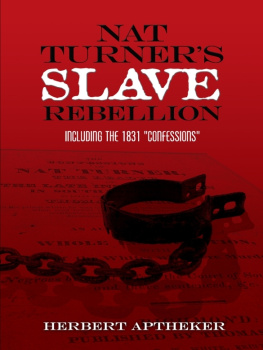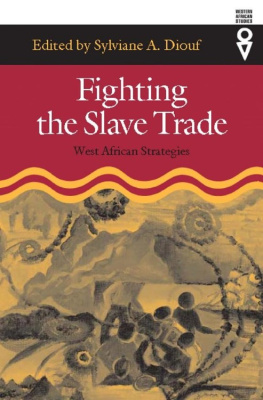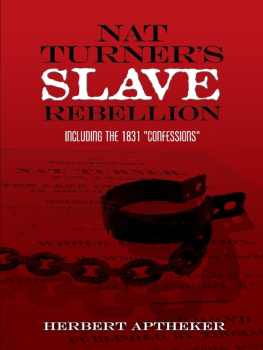Urbainczyk - Slave Revolts in Antiquity
Here you can read online Urbainczyk - Slave Revolts in Antiquity full text of the book (entire story) in english for free. Download pdf and epub, get meaning, cover and reviews about this ebook. City: Greece;Rome (Empire, year: 2016, publisher: Taylor and Francis Ltd, genre: History. Description of the work, (preface) as well as reviews are available. Best literature library LitArk.com created for fans of good reading and offers a wide selection of genres:
Romance novel
Science fiction
Adventure
Detective
Science
History
Home and family
Prose
Art
Politics
Computer
Non-fiction
Religion
Business
Children
Humor
Choose a favorite category and find really read worthwhile books. Enjoy immersion in the world of imagination, feel the emotions of the characters or learn something new for yourself, make an fascinating discovery.
- Book:Slave Revolts in Antiquity
- Author:
- Publisher:Taylor and Francis Ltd
- Genre:
- Year:2016
- City:Greece;Rome (Empire
- Rating:3 / 5
- Favourites:Add to favourites
- Your mark:
- 60
- 1
- 2
- 3
- 4
- 5
Slave Revolts in Antiquity: summary, description and annotation
We offer to read an annotation, description, summary or preface (depends on what the author of the book "Slave Revolts in Antiquity" wrote himself). If you haven't found the necessary information about the book — write in the comments, we will try to find it.
Slave Revolts in Antiquity — read online for free the complete book (whole text) full work
Below is the text of the book, divided by pages. System saving the place of the last page read, allows you to conveniently read the book "Slave Revolts in Antiquity" online for free, without having to search again every time where you left off. Put a bookmark, and you can go to the page where you finished reading at any time.
Font size:
Interval:
Bookmark:
Slave Revolts in Antiquity
Slave Revolts in Antiquity
Theresa Urbainczyk

Contents
I thought a book about slave revolts in antiquity was a great project. I came up with it in 2000 and over the past eight years more colleagues than I care to remember have tried to dissuade me from it. The process of writing and rewriting has been at times extremely dispiriting but I still think the subject deserves several books and am more than happy to have finished this. Consequently, my thanks to those individuals who have encouraged me are more than usually heartfelt. First I must acknowledge with gratitude that University College Dublin allowed me to take two semesters of sabbatical leave, the first spent in Berlin in 2004, the second in Warsaw in 2007. Giving papers in the Free University and the Humboldt University made me rethink my ideas several times and I owe much to the audiences in both places. I am grateful to the Royal Irish Academy and the Polish Academy of Sciences for the grant that enabled me to go to Warsaw for the first time.
Two conferences helped sustain me: one in Galway (Slave Systems, Ancient and Modern, organized by Enrico del Lago and Constantina Katsari in November 2004); the other in Hull (Slavery, Unfinished Business, organized by the Wilberforce Institute for the Study of Slavery and Emancipation in May 2007). I would like especially to thank Kevin Bales, Keith Bradley, Douglas Egerton, Vernita Irvin, Constantina Katsari and Orlando Patterson. Their comments on my talks were more helpful than they will ever know.
This book is much better because of the observations of the anonymous readers, and my copy-editor, Kate Williams, for Acumen, and I acknowledge gratefully their contribution to the finished product. Jan Willem Drijvers and Stephen Mennell both read full drafts of this book and were kind enough to tell me to carry on with it. I owe a special debt to Wilfried Nippel, who commented on a late draft very carefully and saved me from many errors. Niall McKeown also read this, and his challenging remarks improved it substantially. Stelios Mallikourtis taught me much about ancient and modern Greece and took an interest in my work when it seemed no one else did. Kieran Allen, Roland Erne and Ireneusz ada have all, at times, persuaded me to finish this, if only because they did not want to hear about it any more. I shall always be grateful to them whatever their motives. Steven Gerrard saw the possibilities of this book and I am happy that he did. I dedicate this to my mother, who would have thought a book about slave revolts in antiquity was a great project.
BCE
Unknown date | Slaves rebel on Samos for six years. After their masters are unable to conquer them, they agree a truce and allow them to leave. The slaves board a ship and go to live in Ephesus. |
Unknown date | After their masters are away on a long campaign, slaves in Scythia take their place; they marry their masters wives and have children by them. |
Slave revolt in Rome. | |
Battle of Marathon. Athenians and Plataeans defeat the Persians. | |
Battles of Thermopylae and Salamis; end of Persian invasion of Greece. | |
Taking advantage of an earthquake in Sparta, some helots rebel, and occupy Mount Ithome. After ten years the Spartans still cannot defeat them, so they are allowed to leave the Peloponnese and settle in Naupactus on the Corinthian gulf. | |
Slave revolt in Rome, led by Herdonius the Sabine. | |
431404 | Peloponnesian War, the war between Athens and Sparta and their respective allies. |
Late-5th century | Herodotus is writing his Histories. Threat of helot revolt affects Spartan policy during the Peloponnesian War. |
Athenians land in Pylos on the Pelopponese, hoping to gain the help of the local helots. They score an important victory. | |
Slave revolt in Rome. | |
Unspecified date | Spartans kill 2,000 helots in an attempt to gain control. |
415413 | Slaves desert in Sicily as the Athenians start to lose ground there. |
20,000 slaves desert from Athens taking advantage of the Spartan occupation of Decelea in Attica. | |
Defeat of Athens. Thucydides is writing The History of the Peloponnesian War. | |
Early-4th century | Xenophon is composing Hellenica. |
Cinadon leads a conspiracy of helots and others against the Spartans. | |
3rd century | A group of rebel slaves survives in Chios with the leadership of Drimakos, and later without it. |
The Romans conquer southern Italy. | |
264241 | First Punic (Carthaginian) War. |
Slave revolt in Rome. | |
218201 | Second Punic War. |
Slave revolt in Rome. | |
Battle of Cannae, victory for Hannibal. | |
Defeat of Hannibals army at Zama. | |
Slave revolt in Setia in Italy. | |
End of Second Macedonian War. The Romans defeat the army of Philip V of Macedon. Roman territory in Spain is formally constituted into the provinces or Nearer Spain and Further Spain. | |
Slave revolt in Etruria. | |
192188 | Syrian War. Antiochus III surrenders territory in Europe and Asia Minor to the Romans. |
Font size:
Interval:
Bookmark:
Similar books «Slave Revolts in Antiquity»
Look at similar books to Slave Revolts in Antiquity. We have selected literature similar in name and meaning in the hope of providing readers with more options to find new, interesting, not yet read works.
Discussion, reviews of the book Slave Revolts in Antiquity and just readers' own opinions. Leave your comments, write what you think about the work, its meaning or the main characters. Specify what exactly you liked and what you didn't like, and why you think so.











